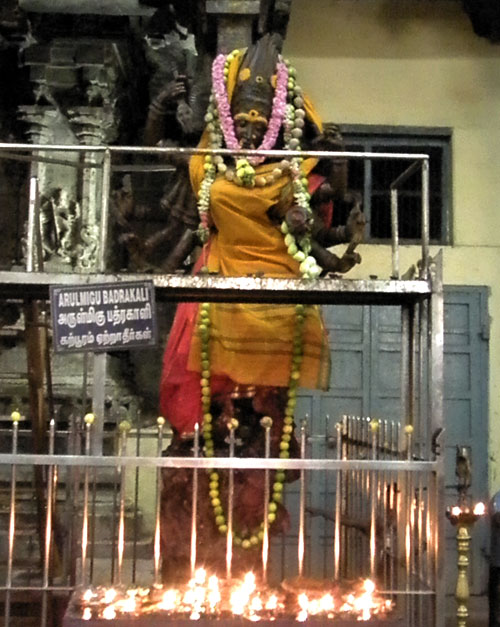The Angry Goddess who we love, unabashedly.
 |
| Image depicting Mother Kali of Kalighat temple, Kolkata. |
I was inducted into Kali worship at a tender age, when I was taken to a humble, unassuming shrine in Theni, housing a 3 foot high figurine of the female deity identified as Veeramaakali Amman (Veera - Valour; Maa - Great; Kali Amman - Mother Kali : adds up to 'Mother Kali of Great Valour'); my maternal grandmother (Ammachi, as we say in Tamil), said : "They call Her the powerful, angry Goddess; but you should regard Her as your own Mother, fearing Her only when you go wrong."
As it is, I developed a genuine affection for the Angry Goddess, who, by my mother's own definition, never ever judged or abandoned people who loved Her.
Thus I grew up nurturing love for the form of the Divine Feminine, referred to by theoretical objectivists as 'a shockingly unconventional and unruly goddess who revels in power, destruction and bloodlust'. Too narrow a description, She might say in good jest.
I devoured stories that spoke of Her, particularly, the earthy, folksy versions. I came across several folktales that speak of Her immense sense of humor - legend has it that Tenali Rama, the wise jester who adorned the royal court of the great king Shri Krishnadevaraya, was himself a great devotee of Mother Kali; The royal jester was rewarded with many boons, including his characteristic presence of mind, for his sense of humor that amused the Mother.
Also, there remain several stories where She is manifest as the bestower of knowledge, literary prowess and esoteric wisdom; Kavi Kalidasa, Ramakrishna Paramahansa, Swami Vivekananda and (the sadly under-recognized) Mahakavi Subramanya Bharathi were all devotees of the Mother and attributed their collective wisdom to Her Divine Grace. Mahakavi Bharathi's work of poetry titled 'Kaali paatu' (காளிப் பாட்டு) or the Song of Kali, is an exemplary piece of work that depicts his boundless devotion to Kali and his poetic genius.
And of course, Kali has always been the patron deity of battlefields, valour, power and victory. The iconic Mahabharata and the Ramayana have several instances where She was worshipped on the precincts of a raging battle. Some folktales identify Lord Krishna and/or Draupadi with Kali.
 |
| BhadraKali in all magnificence as seen at Meenakshi Amman Temple, Madurai. |
Delving into Tamil literature, one comes across Kottravai, the primordial Mother Goddess of the ancient Tamils. She was revered as the Supreme Godhead, as the Goddess of War and Victory and the embodiment of Nature - one might as well interpret that Kottravai could have been Kali by another name.
Ancient Sangam literature draws references to the Goddess as one who is seen wandering on the battlefield as the very embodiment of rage (Kalingathuparani). Often, the valour of the brave warriors and the rage they poured out were attributed/compared to that of Kottravai Herself (Sirupānātruppadai). The ancient epics of Silappadikaram and Manimekalai are, again, treasure troves of information on Kotravai/Kali worship. True, human sacrifices had been in vogue and it is noteworthy that most of them were cases of self-sacrifices, as in the story of Aravan (of Mahabharata). Kali/ Kotravai worship, despite the bloodshed involved, seems to have flourished from times immemorial.
With evolving times, human sacrifice gave way to animal sacrifice and the latter was sufficiently abolished in several parts of the country, save temples like that of the legendarily powerful and mysterious Kamakhya. Perhaps, as popularly established, the Divine would accept any offering 'offered with love by the devotee in pure consciousness'. For where the human mind is limited by judgement, the Divine exceeds all boundaries and definitions.
One might delve even deeper to realize that we are all but instruments of Her Divine play and what we do to please Her, may not be attributed to our mortal selves, but always to Her Divine Will; where it is only by Her Divine Grace that we might even choose to think of Her.
Ancient Sangam literature draws references to the Goddess as one who is seen wandering on the battlefield as the very embodiment of rage (Kalingathuparani). Often, the valour of the brave warriors and the rage they poured out were attributed/compared to that of Kottravai Herself (Sirupānātruppadai). The ancient epics of Silappadikaram and Manimekalai are, again, treasure troves of information on Kotravai/Kali worship. True, human sacrifices had been in vogue and it is noteworthy that most of them were cases of self-sacrifices, as in the story of Aravan (of Mahabharata). Kali/ Kotravai worship, despite the bloodshed involved, seems to have flourished from times immemorial.
With evolving times, human sacrifice gave way to animal sacrifice and the latter was sufficiently abolished in several parts of the country, save temples like that of the legendarily powerful and mysterious Kamakhya. Perhaps, as popularly established, the Divine would accept any offering 'offered with love by the devotee in pure consciousness'. For where the human mind is limited by judgement, the Divine exceeds all boundaries and definitions.
One might delve even deeper to realize that we are all but instruments of Her Divine play and what we do to please Her, may not be attributed to our mortal selves, but always to Her Divine Will; where it is only by Her Divine Grace that we might even choose to think of Her.
"யாதுமாகி நின்றாய் காளி! - எங்கும் நீ நிறைந்தாய்;
தீது நன்மை யெல்லாம் - காளி! - ,தெய்வ லீலை யன்றோ."
தீது நன்மை யெல்லாம் - காளி! - ,தெய்வ லீலை யன்றோ."
(Mother Kali, it is You who pervades the Universe. You are what is manifest in all objects and beings. Be it good, be it evil, all actions are always attributed to nothing but Your Divine Play.)
- Mahakavi Subramanya Bharathi



Comments
Post a Comment